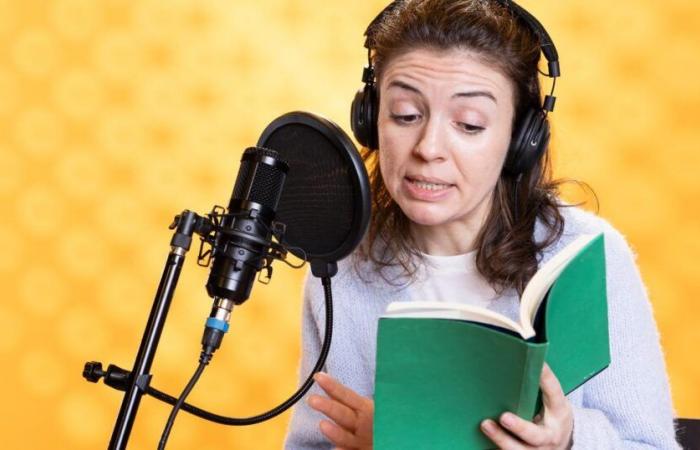INTERVIEW – Each year, the Donneurs de Voix association awards a national audio reading prize to a book. Meeting with Claudine Barideau, its president.
The popularity of audiobooks continues to grow. At the start of 2022, France had 9.9 million “audio players”according to the barometer on the uses of digital and audio Books produced by the French Society of the Interests of Written Authors (SNE). Five years ago, only 8% of French people had listened to an audio book in the past year. Since then, a survey published in April 2023, carried out by OpinionWay and commissioned by Audible, Amazon’s audiobook subsidiary, revealed that 57% of those questioned revealed that they regularly listen to audio content.
Also readThe growing success of audio books
But, among the audio giants that are Apple Books, Nextory, Kobo and Storytel, there is a site hosting a free catalog of more than 76,000 titles including 17,000 downloadable titles. But not just any one: that of “Sound libraries”managed by the Donneurs de Voix association created in 1972 and recognized as being of public utility in 1977. And for a very specific audience. On the occasion of the presentation of the national audio reading prize to the winner Anthony Passeron for his title The sleeping children (Globe) and awarded by the Donneurs de Voix association in Lyon, we met its president, Claudine Barideau.
LE FIGARO. – How was the Donneurs de voix association born?
Claudine BARIDEAU. – The association was born in 1972 on the initiative of a group of friends headed by an ophthalmologist named Charles-Paul Wannebroucq. Through his profession, he was aware of vision problems. With the help of the Lille-Centre Lions Club, of which the latter was a member, they began recording 90-minute cassettes in an apartment belonging to the philanthropic organization. Initially, the idea was to give them to elderly people who, upon reaching a certain age, became blind. For this, they created the first sound library then the association of “Voice Givers”. The idea was then taken up again, there are now 105 sound libraries in France which are all secondary establishments of the association. Today we have over 30,000 member listeners.
You even have a literary prize for audio books.
This award has existed for fourteen years. For us, it is a way of promoting literature and reading within a public that is prevented from reading. We offer our readers the opportunity to be members of the jury, we submit several books to them which they classify (we have around 400 audio readers spread across 61 sound libraries). We do not necessarily follow the logic of the major literary prizes, we in fact select the first or second book by a French author living in France and who has not received a significant literary prize. So this year, our choice fell on a book that had won a lot of awards, but we had started the selection procedure well in advance since it takes about a year to choose the winner. The volunteers will identify the books, choose them, suggest them, record them before offering them to our audio readers who have several months before deciding. This year, it was the title Sleeping Children by Anthony Passeron that really interested our listeners.
Also readArtificial intelligence is shaking up the audiobook sector
With the growing success of audio books, isn’t there competition with your association?
Our association has a special role. Our audioreaders are always people “prevented from reading”. We do indeed have the exception to copyright under disability. But beyond visual disability, we are now open to different forms of disability thanks to legal authorizations. Many of our young readers struggle with dyslexia or dyspraxia. We also have people with aphasia who will have access to our audiobooks.
We offer them our recordings for free, whether books or magazines, since we are only volunteers. Those who have access to our site are people registered with us and having a sworn certificate with proof attesting that they have a disability which prevents them from reading. We also have doctors who refer hearing-impaired people to us because it seems that this allows them to train the hearing they have left. As with paper books, there are different publishers, we can be complementary. I’m sure there are some of our audio players who also subscribe to Audiolib.
I discovered lots of authors thanks to the association and audio books and that is really a great pleasure
Claudine Barideau, president of the Donneurs de Voix association
Are you surprised by the popularity of audiobooks among audiences without special needs?
We do not read in the same way with our eyes or with our ears. With the eyes, we tend to scan while with the hearing, we discover passages that we had not caught and which were read quickly. We have audio readers who tell us they keep the paper, even if they can no longer see very well, because they need the smell of the paper, for example. Everyone has a relationship with the book that is very personal. Society is evolving, some prefer audio, others prefer to read on a tablet while others want to keep the paper book. This allows different audiences to encounter an imagination.
Also readWith Lizzie, Editis joins the emerging audiobook market
How do you select books to read for your catalog?
Above all, the person giving the vote must want to read it since we only read a book that we like or a theme that we like. Afterwards, it happens that at the request of an audio reader, we record a book that he has chosen. We also support young people in their education by giving them French books studied in class. Their teachers tell us what books they are going to study, if they do not have it in audio form, we will ask a voice donor to read it.
Afterwards, we try to have all the literary prizes and to be eclectic enough in our recordings so that the listener finds a variety of books on our portal as if he were going to a library. Some readers came for one type of reading, they ended up discovering a diversity of books. Personally, I discovered lots of authors thanks to the association and it’s really our great pleasure.






